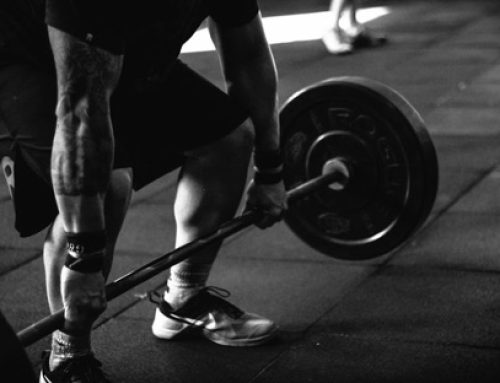Are you tired of slogging through endless hours of cardio and depriving yourself of carbs in the name of weight loss? What if we told you that there was a way to optimize your workout with just a simple tweak to your routine? That’s right, folks, we’re talking about the holy grail of fitness: fasted weight lifting. It’s the magical combination of lifting heavy, pumping iron, and depriving your body of sustenance all at once. But don’t just take our word for it, let’s dive in and explore the wondrous benefits of fasted weight lifting. Buckle up, because it’s going to be a wild ride.
Contents
- 1 1. The Power of Fasting: A Game-Changer in Weight Lifting
- 2 The Hidden Secret for Big Gains: Fast Your Way to Success
- 3 2. Maximizing Results: How Fasting Boosts Your Weight Lifting Performance
- 4 3. Unlocking Cellular Regeneration: The Science Behind Fasted Weight Lifting
- 5 4. Shedding Fat and Gaining Muscle: The Dual Benefits of Fasted Weight Lifting
- 6 5. Fueling Your Body Efficiently: Tips for Incorporating Fasting into Your Weight Lifting Routine
- 7
- 8 No Pain, No Gain…But With Some Benefits
1. The Power of Fasting: A Game-Changer in Weight Lifting
The Hidden Secret for Big Gains: Fast Your Way to Success
Let’s face it, we’re all looking for that one game-changing trick that will take our weight lifting to the next level. We want to pack on muscle, burn fat, and get strong enough to lift a car. Unfortunately, no amount of protein shakes or trendy workout routines can do that on their own. But fear not, my friends, because I’m about to let you in on a little secret… Fasting.
Yes, you heard me right. Fasting. No, I’m not talking about running on an empty stomach for a day or two. I’m talking about strategic, controlled, intermittent fasting. Why? Well, when you fast, your body shifts into fat-burning mode, which means you can burn fat while preserving lean muscle tissue. Not only that, but fasting can also stimulate growth hormone production, which is essential for building muscle and recovering from workouts.
- Ready to give it a try? Here are some tips:
- Start slow – try fasting for 12-16 hours at a time, and gradually work your way up to longer periods.
- Stay hydrated – drink plenty of water (or black coffee or tea) during your fasting period.
- Break your fast with nutrient-dense foods – don’t binge on junk food after a fast, or you’ll undo all your hard work!
So there you have it. The power of fasting can be a total game-changer in your weightlifting journey. Of course, as with any diet or exercise change, consult your doctor before getting started and listen to your body. But if you’re up for a challenge and ready for some serious gains, give fasting a try and see how far it can take you!

2. Maximizing Results: How Fasting Boosts Your Weight Lifting Performance
So, you’re a weightlifter? That’s awesome. If you’re looking for ways to boost your performance and get the most out of your workouts, have you considered fasting? Yes, you heard me right – fasting. It may seem counterintuitive, but there’s actually a lot of science behind how fasting can help you build muscle, increase endurance, and hit new personal bests in the gym. Here’s how:
First and foremost, fasting has been shown to increase levels of human growth hormone (HGH) in the body. This is the same hormone that’s responsible for stimulating muscle growth and repair, so it’s kind of a big deal. When you fast, your body enters a state of ketosis where it starts burning fat for fuel instead of glucose. This leads to an increase in HGH production, which can help you build lean muscle mass and recover faster from workouts.
Secondly, fasting can help you improve your insulin sensitivity. Insulin is the hormone that regulates blood sugar levels and also plays a role in muscle growth. When you eat frequent meals throughout the day, your body is constantly producing insulin to keep up with the influx of glucose. However, when you fast, your body becomes more efficient at using insulin and can better shuttle glucose into your muscles for fuel. This can help you train harder and longer without getting as fatigued.
- Boosts human growth hormone (HGH) levels
- Improves insulin sensitivity
- Allows for better hydration
Lastly, fasting can help you stay hydrated during your workouts. When you eat carbs, your body stores them in the form of glycogen in your muscles and liver. For each gram of glycogen stored, your body also stores about 3-4 grams of water. This can lead to bloating and water retention, which can make it harder to stay properly hydrated during your workouts. However, when you fast and your glycogen stores are depleted, your body won’t be holding onto as much water. This can make it easier to stay hydrated and avoid cramping or fatigue during intense weightlifting sessions.
3. Unlocking Cellular Regeneration: The Science Behind Fasted Weight Lifting
Have you ever heard of cellular regeneration? It sounds like something straight out of a sci-fi movie, but in fact, it’s the process by which our body regenerates new cells. And believe it or not, fasted weight lifting can actually help accelerate this process!
But how exactly does it work? When you lift weights on an empty stomach (fasted), your body produces more growth hormone. This hormone is essential for stimulating cellular regeneration and repairing damaged tissues. Plus, fasted weight lifting also helps increase insulin sensitivity, which promotes the uptake of amino acids and other nutrients needed for cellular regeneration.
So, next time you hit the gym, consider trying fasted weight lifting. Not only will it help you shed those extra pounds, but it can also kickstart your body’s natural cellular regeneration process. Just be sure to listen to your body – if you feel light-headed or overly fatigued, it might be time to grab a snack. And remember to stay hydrated too, as water is essential for all bodily processes, including cellular regeneration.
4. Shedding Fat and Gaining Muscle: The Dual Benefits of Fasted Weight Lifting
If you’re like most people, then shedding fat and gaining muscle at the same time probably sounds like a workout myth. But believe it or not, there’s a way to do it that doesn’t involve drinking green smoothies or cutting out carbs altogether. The secret? Fasted weight lifting.
Now, before you start fist-pumping and chanting “fasted weight lifting” in your local gym, let me explain just what this means. Fasted weight lifting is exactly what it sounds like: lifting weights on an empty stomach. And no, this doesn’t involve starving yourself or avoiding food altogether. It simply means not eating any major meals within a few hours of your workout.
So, why is this the magic combo for shedding fat and building muscle? Well, when you lift weights on an empty stomach, your body uses stored fat as its primary source of energy. Plus, the fasting state also causes a surge in growth hormone levels, which helps promote muscle growth. Talk about killing two birds with one stone! So, the next time you hit the gym, try incorporating some fasted weight lifting into your routine. Your muscles – and waistline – will thank you.
5. Fueling Your Body Efficiently: Tips for Incorporating Fasting into Your Weight Lifting Routine
So you want to try fasting during your weight lifting routine, eh? Bold move, my friend. But fear not, there are ways to fuel your body efficiently while giving fasting a go. Here are some tips (and a couple of jokes) to get you started:
- Hydrate, Yo: You may not be chowing down on food, but you still need to keep those fluids coming. Water, coffee, tea, diet soda (if that’s your thing)…whatever floats your boat. Just make sure you’re staying hydrated throughout your fasting period.
- Don’t Lift Heavy Stuff on Empty: Lifting weights while fasting can be risky business if you’re not careful. Make sure you’re eating a good pre-workout meal to get your body energized. Carbs are your friend here. If you’re still hesitant, start with lighter weights and work your way up to the heavy stuff.
- Re-fuel Like a Boss: Congratulations, you made it through your fast. Now it’s time to load up those glycogen stores. Make sure you’re eating protein and carbs within a couple hours after your workout. And, you know, maybe throw in a donut as a reward for your hard work. Balance, people.
There you have it. Fasting during your weight lifting routine can be a challenge, but with these tips (and a little humor), you’ll be well on your way to fueling your bod efficiently. Now go get those gains, you fasting fiend.
No Pain, No Gain…But With Some Benefits
You made it to the end of our article on the benefits of fasted weight lifting! Congratulations on taking steps towards a healthier you. We hope you are feeling inspired to try a fasted workout and experience the benefits for yourself.
Remember, the key to success is discipline and consistency, but don’t forget to also treat yourself occasionally. Yes, that means you can have that slice of pizza after your workout. Just make sure it’s not on your fasted day!
As with any fitness routine, it’s important to listen to your body and adjust accordingly. Fasted weight lifting may not be for everyone, but it’s worth giving it a shot.
So go ahead, channel your inner Arnold Schwarzenegger and lift those weights on an empty stomach. Your body will thank you for it (eventually).








Leave A Comment